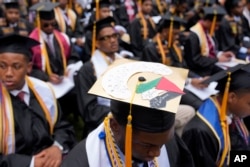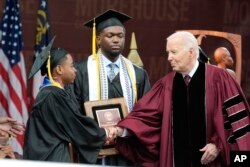Student Union
Arrests roil campuses nationwide ahead of graduation
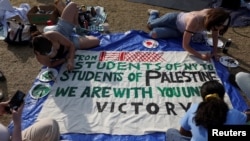
Protests are roiling college campuses nationwide as schools with graduation ceremonies next month face demands they cut financial ties to Israel because of the Israel-Hamas war.
Many campuses were largely quiet over the weekend but protesters on both sides of the issue shouted and shoved each other during dueling demonstrations Sunday at the University of California, Los Angeles.
About 275 people were arrested on Saturday at various campuses including Indiana University at Bloomington, Arizona State University and Washington University in St. Louis.
The number of arrests nationwide approached 900 since New York police removed a pro-Palestinian protest encampment at Columbia University and arrested more than 100 demonstrators on April 18.
Since then, students have dug in at dozens of pro-Palestinian encampments around the country, prompting a range of responses from administrators: arrests and criminal charges, student suspensions or simply continued pleas to leave.
The plight of students has become a central part of protests, with both the students and a growing number of faculty demanding amnesty for protesters. At issue is whether the suspensions and legal records will follow students through their adult lives.
Faculty members at universities in California, Georgia and Texas have initiated or passed largely symbolic votes of no confidence in their leadership.
White House national security spokesman John Kirby said President Joe Biden "knows that there are very strong feelings" but would leave managing the protests to local authorities.
"People should have the ability to air their views and to share their perspectives publicly but it has to be peaceful," Kirby said on ABC's "This Week."
In an interview that aired Sunday, Senate Republican Leader Mitch McConnell called it "a dangerous situation" and placed the responsibility with college administrators.
"There's also antisemitism, which is completely unacceptable. I've been shocked to see that in this country," he said on NBC's "Meet the Press."
How it started
Early protests at Columbia University in New York City sparked pro-Palestinian demonstrations across the country and students and administrators there have engaged in negotiations, the university said in a statement Saturday night.
Columbia has set a series of deadlines for protesters to leave the encampment — which they have missed — but bringing back police "at this time" would be counterproductive, the school wrote in an email to students.
On Sunday, students walked among dozens of colorful tents that continue to stand.
California
At the University of California, Los Angeles, police set up barricades before hundreds of demonstrators on both sides joined a growing crowd Sunday near where pro-Palestinian students have been staying around-the-clock in tents. Counter-protesters who organized a "Stand in Support of Jewish Students" rally said their goal was to "stand up against hatred and antisemitism."
Across town, the University of Southern California said it was open Sunday after being shut down a day earlier because of what the university called vandalism and disruptions.
USC drew criticism after refusing to allow the valedictorian, who has publicly supported the Palestinian cause, to make a commencement speech. Administrators then scrapped the keynote speech by filmmaker Jon M. Chu. Last week the school announced the cancelation of its main graduation event, a day after more than 90 protesters were arrested by police in riot gear.
In the northern part of the state, officials on Saturday ordered an "enforced hard closure" of California State Polytechnic University, Humboldt. Two halls remained occupied by pro-Palestinian demonstrators. The school said Sunday that the cost of the occupation — including damage done by "theft, vandalism and graffiti" — was estimated to be in the millions.
Missouri
Washington University in St. Louis locked some campus buildings and arrested protesters Saturday. Photos showed uniformed police attempting to remove masked protesters as others, also wearing masks, linked arms to thwart the efforts.
In a statement, the university said more than 100 people — including 23 students and four university employees — were arrested on suspicion of trespassing. Megan Green, president of the St. Louis Board of Aldermen, said in a social media post that she was present and the protest remained calm "until the police came in like an ambush."
Green Party presidential candidate Jill Stein said in a social media post that she and two of her campaign managers were among those arrested.
The university's statement defended the action and said protesters "did not have good intentions on our campus and that this demonstration had the potential to get out of control and become dangerous."
Some arrested also face charges of resisting arrest and assault, including for injuries to three police officers, the statement said. Those injuries include a severe concussion, a broken finger and a groin injury.
The Missouri chapter of the Council on American-Islamic Relations condemned the arrests as "heavy-handed."
Massachusetts
In Boston, police in riot gear cleared an encampment on the campus of Northeastern University on Saturday.
Massachusetts State Police said about 102 protesters were arrested and will be charged with trespassing and disorderly conduct.
Northeastern said in a statement that the demonstration, which began two days ago, had become "infiltrated by professional organizers" with no affiliation to the university and antisemitic slurs, including "kill the Jews," had been used.
The Huskies for a Free Palestine student group disputed the university's account, saying in a statement that counterprotesters were to blame for the slurs and no student protesters "repeated the disgusting hate speech."
Students at the Boston protest said a counterprotester attempted to instigate hate speech but insisted their event was peaceful.
U.S. campuses and the Israel-Hamas war
The nationwide campus protests began in response to Israel's offensive in Gaza. Hamas launched a deadly attack on southern Israel on Oct. 7, when militants killed about 1,200 people, most of them civilians, and took roughly 250 hostages. Vowing to stamp out Hamas, Israel launched an offensive in Gaza. In the ensuing war, Israel has killed more than 34,000 Palestinians in the Gaza Strip, according to the local health ministry.
Israel and its supporters have branded the university protests as antisemitic, while critics of Israel say it uses such allegations to silence opponents. Although some protesters have been caught on camera making antisemitic remarks or violent threats, organizers of the protests, some of whom are Jewish, say it is a peaceful movement aimed at defending Palestinian rights and protesting the war.
See all News Updates of the Day
- By VOA News
Writer offers packing tips for international students
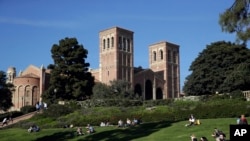
Deciding what to bring to college can be daunting.
A student from Singapore writes about her must-haves as an international student in the U.S.
Read it here. (April 2024)
- By VOA News
Siblings flourish at University of Cincinnati
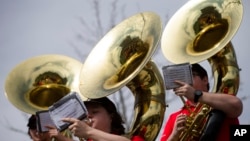
Two sets of siblings -- on from Kuwait and one from Saudi Arabia -- talk about their experiences as international students at the University of Cincinnati in the U.S. state of Ohio.
Read the story here. (April 2024)
Pro-Palestinian protesters set up a new encampment at Philadelphia's Drexel University

Pro-Palestinian protesters set up a new encampment at Drexel University in Philadelphia over the weekend, prompting a lockdown of school buildings, a day after authorities thwarted an attempted occupation of a school building at the neighboring University of Pennsylvania campus.
After several hundred demonstrators marched from Philadelphia's City Hall to west Philadelphia on Saturday afternoon, Drexel said in a statement that about 75 protesters began to set up an encampment on the Korman Quad on the campus. About a dozen tents remained Sunday, blocked off by barricades and monitored by police officers. No arrests were reported.
Drexel President John Fry said in a message Saturday night that the encampment "raises understandable concerns about ensuring everyone's safety," citing what he called "many well-documented instances of hateful speech and intimidating behavior at other campus demonstrations." University buildings were "open only to those with clearance from Drexel's Public Safety," he said.
Authorities at Drexel, which has about 22,000 students, were monitoring the demonstration to ensure it was peaceful and didn't disrupt normal operations, and that "participants and passersby will behave respectfully toward one another," Fry said.
"We will be prepared to respond quickly to any disruptive or threatening behavior by anyone," Fry said, vowing not to tolerate property destruction, "harassment or intimidation" of students or staff or threatening behavior of any kind, including "explicitly racist, antisemitic, or Islamophobic" speech. Anyone not part of the Drexel community would not be allowed "to trespass into our buildings and student residences," he said.
On Friday night, members of Penn Students Against the Occupation of Palestine had announced an action at the University of Pennsylvania's Fisher-Bennett Hall, urging supporters to bring "flags, pots, pans, noise-makers, megaphones" and other items.
The university said campus police, supported by city police, removed the demonstrators Friday night, arresting 19 people, including six University of Pennsylvania students. The university's division of public safety said officials found "lock-picking tools and homemade metal shields," and exit doors secured with zip ties and barbed wire, windows covered with newspaper and cardboard and entrances blocked.
Authorities said seven people arrested would face felony charges, including one accused of having assaulted an officer, while a dozen were issued citations for failing to disperse and follow police commands.
The attempted occupation of the building came a week after city and campus police broke up a two-week encampment on the campus, arresting 33 people, nine of whom were students and two dozen of whom had "no Penn affiliation," according to university officials.
On Sunday, dozens of George Washington University graduates walked out of commencement ceremonies, disrupting university President Ellen Granberg's speech, in protest over the ongoing siege of Gaza and last week's clearing of an on-campus protest encampment that involved police use of pepper spray and dozens of arrests.
The ceremony, at the base of the Washington Monument, started peacefully with fewer than 100 protesters demonstrating across the street in front of the Museum of African American History and Culture. But as Granberg began speaking, at least 70 students among the graduates started chanting and raising signs and Palestinian flags. The students then noisily walked out as Granberg spoke, crossing the street to a rapturous response from the protesters.
Students and others have set up tent encampments on campuses around the country to protest the Israel-Hamas war, pressing colleges to cut financial ties with Israel. Tensions over the war have been high on campuses since the fall but demonstrations spread quickly following an April 18 police crackdown on an encampment at Columbia University.
Nearly 3,000 people have been arrested on U.S. campuses over the past month. As summer break approaches, there have been fewer new arrests and campuses have been calmer. Still, colleges have been vigilant for disruptions to commencement ceremonies.
President Joe Biden told the graduating class at Morehouse College on Sunday, which included some students wearing keffiyeh scarves around their shoulders on top of their black graduation robes, that he heard their voices of protest and that scenes from the conflict in Gaza have been heartbreaking. Biden said given what he called a "humanitarian crisis" there, he had called for "an immediate cease-fire" and return of hostages taken by Hamas.
The latest Israel-Hamas war began when Hamas and other militants stormed into southern Israel on Oct. 7, killing around 1,200 people and taking an additional 250 hostage. Palestinian militants still hold about 100 captives, while Israel's military offensive has left more than 35,000 people in Gaza dead, according to the territory’s health ministry, which doesn't distinguish between civilians and combatants.
Biden tells Morehouse graduates that he hears their voices of protest over war in Gaza
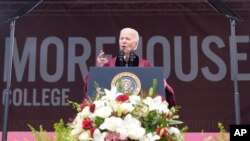
President Joe Biden on Sunday told the graduating class at Morehouse College that he heard their voices of protest over the Israel-Hamas war, and that scenes from the conflict in Gaza have been heartbreaking.
"I support peaceful nonviolent protest," he told students, some who wore keffiyeh scarves around their shoulders on top of their black graduation robes. "Your voices should be heard, and I promise you I hear them."
The president told the crowd that it was a "humanitarian crisis in Gaza, that's why I've called for an immediate cease-fire to stop the fighting" and bring home the hostages taken when Hamas attacked Israel on Oct. 7. The comments, toward the end of his address that also reflected on American democracy and his role in safeguarding it, were the most direct recognition to U.S. students about the campus protests that have swept across the country.
Morehouse's announcement that Biden would be the commencement speaker drew some backlash among the school's faculty and supporters who oppose Biden's handling of the war. Some Morehouse alumni circulated an online letter condemning school administrators for inviting Biden and soliciting signatures to pressure Morehouse President David Thomas to rescind it.
The letter claimed that Biden's approach to Israel amounted to support of genocide in Gaza and was out of step with the pacifism expressed by Martin Luther King Jr., Morehouse's most famous graduate.
The Hamas attack on southern Israel killed 1,200 people. Israel's offensive has killed more than 35,000 Palestinians in Gaza, according to local health officials.
Some members of the graduating class showed support for Palestinians in Gaza by tying keffiyeh scarves around their shoulders on top of their black graduation robes. One student draped himself in a Palestinian flag. On the stage behind the president, academics unfurled a Democratic Republic of Congo flag.
The country has been mired in an ongoing civil war that has plunged the nation into violence and displaced millions of people. Many racial justice advocates have called for greater attention to the conflict and for greater attention in the US to the conflict as well as American aid in ending the violence.
"Thank you God for this 'woke' class of 2024 that is in tune with the zeitgeist, the spirit of the times," the Rev. Claybon Lea Jr. said during a prayer at the start of the commencement.
The class valedictorian, DeAngelo Jeremiah Fletcher, said at the close of his speech that it was his duty to speak on the war in Gaza and that it was important to recognize that both Palestinians and Israelis have suffered.
"From the comfort of our homes, we watch an unprecedented number of civilians mourn the loss of men, women and children, while calling for the release of all hostages he said. "It is my stance as a Morehouse man, nay as a human being, to call for an immediate and permanent cease-fire in the Gaza Strip."
Biden stook and shook his hand after Fletcher finished.
The speech, and a separate one Biden is giving later Sunday in the Midwest, is part of a burst of outreach to Black constituents by the president, who has watched his support among these voters soften since their strong backing helped put him in the Oval Office in 2020.
After speaking at Morehouse in Atlanta, Biden will travel to Detroit to address an NAACP dinner.
Georgia and Michigan are among a handful of states that will help decide November's expected rematch between Biden and Republican former President Donald Trump. Biden narrowly won Georgia and Michigan in 2020 and needs to repeat — with a boost from strong Black voter turnout in both cities.
Biden spent the back end of the past week reaching out to Black constituents. He met with plaintiffs and relatives of those involved in Brown v. Board of Education, the landmark 1954 Supreme Court decision that outlawed racial segregation in public schools. He also met with members of the "Divine Nine" Black fraternities and sororities and spoke with members of the Little Rock Nine, who helped integrate a public school in Little Rock, Arkansas, in 1957.
In Detroit, Biden was set to visit a Black-owned small business before delivering the keynote address at the NAACP's Freedom Fund dinner, which traditionally draws thousands of attendees. The speech gives Biden a chance to reach thousands of people in Wayne County, an area that has historically voted overwhelmingly Democratic but has shown signs of resistance to his reelection bid.
Wayne County also holds one of the largest Arab American populations in the nation, predominantly in the city of Dearborn. Leaders there were at the forefront of an "uncommitted" effort that received over 100,000 votes in the state's Democratic primary and spread across the country.
A protest rally and march against Biden's visit are planned for Sunday afternoon in Dearborn. Another protest rally is expected later that evening outside Huntington Place, the dinner venue.
US remains top choice for Indian students going abroad
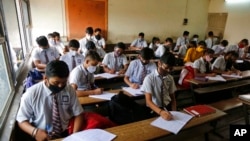
About 69% of Indian students traveling abroad for their studies chose the United States, according to a Oxford International’s Student Global Mobility Index. Other popular choices were the United Kingdom, Canada and Australia.
Education Times reports the main influencers for deciding where to study abroad – for Indian students and others – were parents. (April 2024)




